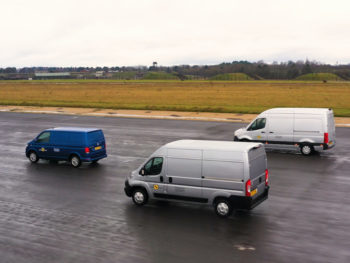Van manufacturers are being urged to increase their standard fitment of collision avoidance tech to protect drivers and the public on the UK’s roads.

New Commercial Van Safety Ratings developed by Euro NCAP and Thatcham Research saw 19 of the UK’s most popular vans tested – representing 98% of new van sales in 2019 – and identified some major safety shortcomings.
The tests looked at the fitment rate and performance of the vans’ active safety, anti-collision technology and concluded that only three vans out of the 19 were worthy of a ‘Gold’ rating: Volkswagen’s Transporter, the Ford Transit and Mercedes-Benz’s Vito.
Meanwhile, five others were ‘Silver’ and another six ‘Bronze’ while five received a ‘Not Recommended’ rating.
The two organisations have also pointed out a marked difference between safety tech in cars and vans; only 12.8% of new vans featured Autonomous Emergency Braking (AEB) in 2019, compared to 62% of new cars.
The Commercial Van Safety Ratings, which will now be carried out annually, come ahead of new General Safety Regulation (GSR) legislation that will require all new vans to be fitted with certain ADAS technology by 2024.
But both organisations are calling for an increased focus on van safety ahead of then, in line with the growing use of vans on UK roads, which has been led by fast-rising home deliveries, in particular during the pandemic. One leading delivery firm expects package deliveries to increase by 23% in 2020.
Thatcham’s director of research Matthew Avery said: “This first batch of test results show the fitment of crucial safety technology on vans in woefully low.
“It’s a serious issue that needs addressing urgently, particularly with van numbers increasing and the continued surge in demand for home deliveries during the pandemic and before Christmas.”
And the need for more stringent van safety tech is reinforced by figures showing vans are involved in more accidents that result in fatal injuries to other road users, per mile travelled, than any other type of vehicle on the UK’s roads.
Avery added: “Decisive action will reduce van collisions, create greater parity between cars and vans, and help to protect the public from serious injury and death as more vehicles on our roads will have lifesaving technology.”
The Driving for Better Business campaign said the new ratings show that fleets should be demanding safety technology on vans, in order to ensure not only that drivers are kept safe, but also that operators realise the business benefits from safer drivers.
Simon Turner, campaign manager for the government-backed Highways England programme, said: “Time and time again, van fleet operators tell us their biggest concerns are the business disruption caused when vans are off the road for repairs, and the rising cost of insuring their vans – often a direct result of their collision record.
“ADAS technology fitted to cars has been proven to significantly reduce collisions, repair costs and third-party claims. Firms that purchase or lease vans should now be looking for these same benefits and specifying this technology on all their new vehicles.”

